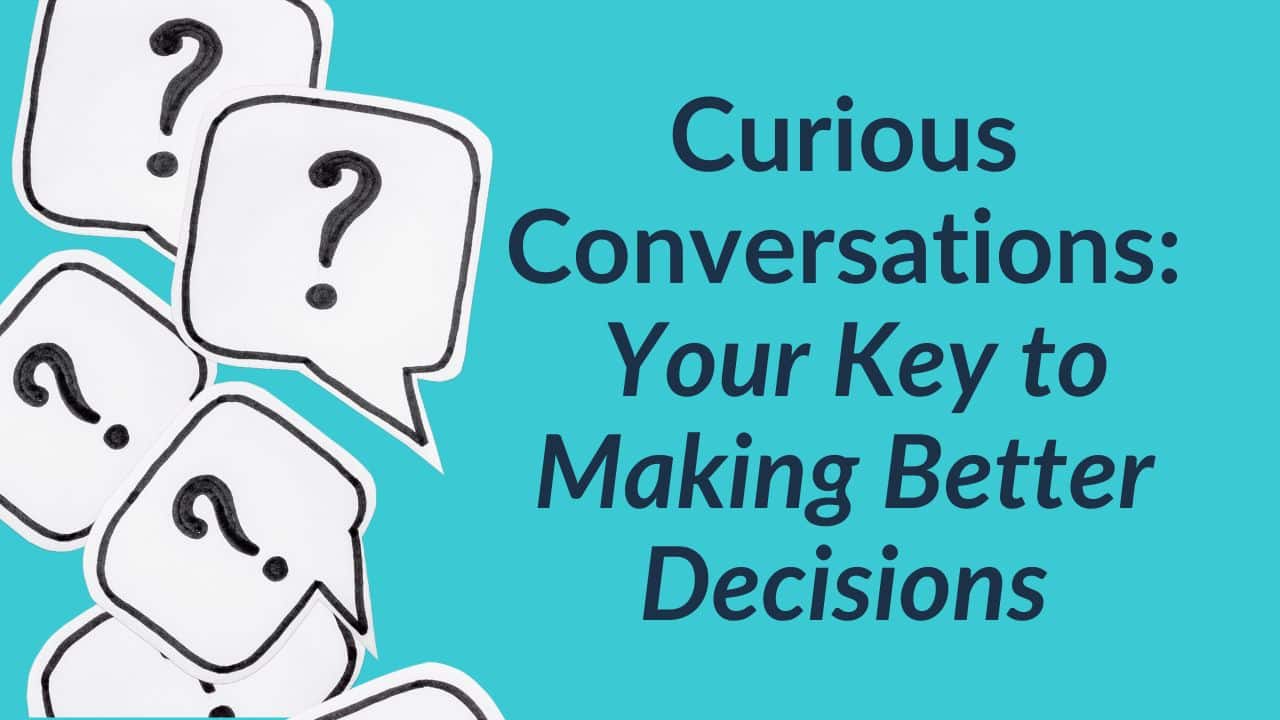Curious Conversations: Your Key to Making Better Decisions

Picture this: I hop into my Lyft to the airport and my driver and I start a conversation about kids. We bond over parental pride and devotion – his two boys and my two boys and a girl. However, election time was nearing and my friendly driver threw into the conversation that he was supporting a different candidate than I was. I was immediately curious what his personal attraction was to this candidate, so I sat there in the backseat phrasing questions in my head, knowing I could never learn what was important to him and why without asking. Yet I remained completely silent on the subject.
The irony of the situation was not lost on me given that I spend much of my days encouraging executives and teams to have challenging conversations. The ones that promote curiosity and exploration rather than hardening of positions. Yet, here I was unable to ask just one curious question to my driver. Some might say that asking a stranger is more risky, while others might think this situation has much less risk than asking their boss why they believe something is the best path.
I had the chance to ask a thoughtful question and I lost it. But I don’t want you to lose yours. Here are my three best ways to ask curious questions that open up opportunities for dialogue and discovery.
Dr Jo’s Best Ways To Be Inquisitive And Learn More:
1. Find that place in you that is TRULY curious. This is the first step and arguably the hardest one even though it seems like it’s the easiest. If you didn’t want to know after all, why would you ask? And yet I’m sure that you, like me, can think of daily examples when we ask questions yet are sure we know the answers:
Parent to child: “Why did you think that was a good idea?”
Manager to Employee: “Did you get that request I sent over?”
Friend to friend: “Are you sure you really want another drink?”
I could go on. . .the point is that many of our questions don’t come from a place of curiosity, they are more of a statement phrased as a question. And honestly, you know when someone asks you a veiled statement. So before you ask a question, you need to locate that part of yourself that knows there might be more to this problem than you know about, that wants to figure out what is really happening, and that is open to being wrong. My Dad used to say that smart trial lawyers never ask a question in court they don’t know the answer to. Assuming we are not in court, the way to find out more is by accepting you don’t have all the answers but are willing to ask and learn.
2. Can you help me understand. . . . I love this sentence starter because it allows you to surface your perspective early on while inviting the other person to share theirs. I believe it’s helpful to own your perspective so that no one feels misled and the other person knows where you’re coming from. This can be as simple as: “I haven’t been in favor of feature Y because I think it’s too costly to develop but can you help me understand why you believe it’s crucial for our next release?” or “I’m wavering between two different remote work proposals, I’d love to understand why you’re so strongly in favor of the first.”
“Can you help me understand” is a simple phrase with a big impact by helping you to gain clarity and unlock someone’s knowledge and beliefs — as long as you’re coming from that truly curious place. (Remember #1)
3. What am I missing? The very wise leadership expert Jennifer Garvey Berger recommends routinely asking ourselves, “How could I be wrong?” about the stories we tell ourselves. Asking someone to help thought-partner with you and discuss what you might be missing about an issue or decision is a way to pressure-test your point of view.
Great leaders and learners always want to question their thinking. The reality is that we can rarely know anything for sure, especially in these times of frequent change, but if we at least understand all the opinions on all sides of an issue, we’re moving forward with better information.
Gathering information is powerful. Annie Duke, world champion poker play and psychologist talks about the power of data this way: If you’re playing poker and you have an 83% of winning the hand, it’s a wise decision to play aggressively. Of course, there’s still a 17% chance you will lose that hand, but if you play the odds well in poker, over time you emerge a winner. She advises that you need to make the best decisions given the information you have, even if doesn’t work out at the end. Good decision-making is about getting more information and using the information you have – it’s about the process, not the results.
Taking Duke’s advice, why wouldn’t you want to fill in as many missing pieces of the puzzle for any important next steps before taking them? Or at the very least, understand why others might perceive very different odds in the same situation.
Yes, I didn’t take my own advice in the Lyft and engage my driver in a political discussion so we’ll never know if these tips would have worked and how it would have gone.
But I encourage you to try these tips at work; the attitude in point one and the queries in points two and three are some of the best ways to emerge with better information, and, according to Annie Duke, your best chance at winning in the long run.